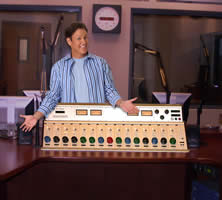 Fred and Paul Jacobs are prolific bloggers; they blog five days a week. Recently, their blog asked four questions about the future of radio. I found them interesting and thought I’d give you my answers to their questions. I’ve provided a link to their original blog post here.
Fred and Paul Jacobs are prolific bloggers; they blog five days a week. Recently, their blog asked four questions about the future of radio. I found them interesting and thought I’d give you my answers to their questions. I’ve provided a link to their original blog post here.
- What is radio? I guess I’d have to say my earliest exposure to radio was of the amplitude modulation kind; AM radio. My first radio was a Zenith transistor AM radio with a single earphone. In junior high school, I would build an AM & FM radio station in the basement of my parent’s home and broadcast to my neighborhood. When I went to the FCC field office in Boston to take my FCC license exam when I was in high school the license I would receive said “Radio Telephone Third Class Operator Permit (Restricted Radiotelephone Certificate).” I remember thinking the day I received it, “Why does it say telephone on it?” Nathan Stubblefield, a Kentucky melon farmer and inventor, invented the first radio (many would say). Nathan invented it because he wanted to be able to talk to his wife at home while driving his car. Maybe Nathan and the FCC were just ahead of their time, for today RF goes through the air to our smartphones giving us the ability to send and receive voice, pictures, and data. Today’s pocket computers – smartphones – have synthesized every form of mass communication into a single device. When Apple was putting together the launch of their Beats 1 stream, Zane Low said they spent three months trying to come up with a name to call what they were about to launch. They couldn’t come up with a better name than radio. And that’s what I find teaching at the university. My students basically call everything audio sourced “radio.” Every semester when I poll my students as to what media device they would keep, if they could only keep one, the overwhelming winner is their smartphone. The reason is simple; it allows them to do everything while every other media devices can only do a single application or two. The History Channel did a program on the 100 Best Inventions of all time. Radio was number two. The smartphone was number one. Today’s smartphone is the “transistor radio” of my youth.
- What are ratings? I’m a graduate of the Roy H. Williams Wizard Academy and Roy believes that any radio station with about thirty thousand listeners has more than enough to drive business for any advertiser. So what’s the defining measure of a radio station? The quality of the content of its advertising. Ratings were only created for one purpose, to sell advertising. Initially a concept called “applause cards” was used by radio operators. These were simple post cards that could be picked up by consumers at local retailers, filled out, and mailed in. The Association of National Advertisers would hire Archibald Crossley to create a way to discern what people were actually listening to on the radio. Crossley would produce reports from his Cooperative Analysis of Broadcasting (CAB) system. CAB used telephone recall much like Tom Birch did with his Birch Ratings reports. Today, everyone’s hung up on the measurement systems of clicks and clacks of the Internet. Ad Blocking is going to put a real dent into this system that really doesn’t tell advertisers what they wanted to know anyway. The simple fact is no one is measuring what counts. Great creative content gets results and radio needs to invest in employing dedicated copywriters once again.
- What is content? I wrote a whole blog post on content that went viral. I won’t re-plow that ground again in this post. If you’d like to read what I wrote, go here.
- What is in-car entertainment? I remember when buying a car, one of the options was adding a rear speaker to your AM radio for passengers riding in the back seat. Those were simpler times. I’ve lived through every new device that was going to be the death of radio in the car: 8-track tapes, cassette tapes, CB radios, CDs, CD changers, MP3 players, smartphones, streaming audio. Nothing has. However, the new digital dashboards appear to be so complicated, I fear for the folks who could never stop the blinking 12:00 on their VCRs. The new learning curve to find the radio on new cars might be a problem. My Honda Accord has lots of digital components to my entertainment system, but what I love most is Honda left the volume control knob I can turn. Rick Dees loves rotary pots on his control consoles and will not work a board that has slider pots.
 Crank it up means turning a knob. Radio people are going to have to make sure their car dealers demonstrate, or even set-up for their new car customers, how to find and lock in their local radio stations on these new digital dashboards. If the radio listener can easily find their favorite hometown companion, then they will default to what they know and love best. The reason radio has retained over 92% of its listeners is because all those new media devices mostly took out the new media device that came before it. Free over-the-air radio is unique and special. Let’s all work to keep it that way.
Crank it up means turning a knob. Radio people are going to have to make sure their car dealers demonstrate, or even set-up for their new car customers, how to find and lock in their local radio stations on these new digital dashboards. If the radio listener can easily find their favorite hometown companion, then they will default to what they know and love best. The reason radio has retained over 92% of its listeners is because all those new media devices mostly took out the new media device that came before it. Free over-the-air radio is unique and special. Let’s all work to keep it that way.
And so that’s my take on Fred and Paul Jacobs “Four Questions for Radio.” What are yours? Please share them with me by writing them into the comment section of this blog. I can wait to read what you have to say.

Dick when do you think was radio’s finest hour any why?
LikeLike
Radio has had so many “finest hours” it would impossible for me to pick one.
But as the Statler Brothers used to end their TV show “be here next time, cause we ain’t even started yet.” I think the same could be said about radio. The best is yet to be.
LikeLike
On this one I’m going to respectfully disagree. I would have guessed it was in the 80’s, this site http://www.cybercollege.com/frtv/frtv018.htm claims it was in the 40’s. Not the gospel truth but interesting read of the monopoly fight between radio and newspapers.
LikeLike
I started in commercial radio in the late 60s and loved it for forty years working in it. My students bring a whole new passion to it and love it the way it is today.
I think its like each generation has its music, its like that with radio as well.
LikeLike
Dick, I’ll play devil’s advocate for the moment and pose 4 additional radio questions, see what sort of feedback they attract, then state my answers. That way (1) I sway nobody, (2) We hopefully get a variety of points of view and (3) Perhaps my responses will stir further follow up. OK, here they are:
(1) Is MUSIC radio as entertaining as it was in 2006 ?
(2) Is TALK radio as relevant and appealing as it was in 2006 ?
(3) A PD informed me radio advertising “always works”. Your opinion ?
(4) Radio’s traditional ‘average’ low pay rates of old + voice tracking and networking now have severely depleted the quality of the worldwide talent bank, Agree/Disagree and ‘Why’ ?
LikeLiked by 1 person
Ian, let’s see what others have to say before we both weigh in on your questions.
LikeLike
I think Michael Drew nailed it when he says, “We are curators of our own content.” This means all media including radio is on a decline and will never return to the golden days of content monopoly. I now get my music via subscription service Rhapsody, I listen to NPR shows and others on podcasts. I surf the stations when I listen to radio so fast I would not be counted as a listener. I get my traffic report via google maps, and I get weather reports on my weather ap. Radio will always be around it’s the medium with the best production time efficiency (ads and content production) compared to TV and print. The challenge for advertisers is listeners who curate what they want to listen to.
LikeLike
Thanks Prof Dick. The 4 Questions: clark smidt on January 27, 2016 at 9:44 AM Outstanding Thought Starter! 1. RADIO IS EVERYWHERE, WIRELESS & FREE. PEPETUAL: BEST SHOW WINS WITH CONTENT, PRESENTATION, PRESENTATION, CONNECTION AND DELIVERY. 2. PROPTLY FCOME UP WITH A WAY TO PROVE RECEPTION & REACTION FOR ALL FORMS OF AUDIO DELIVERY THAT BRING “RADIO” TO A DEVICE NEAR YOU. 3. THERE’S LIVE….AND THERE’S MEMOREX. DELIVER PRODUCT THAT WORKS WELL IN EITHER OR BOTH AND LABLE ACCORDINGLY AND SHAKE WELL BEFORE USING. 4. YES. CARS ARE PRIME LISTENING LOCATIONS. SAME FOR TRAINS, BOATS AND PLANES. AGAIN, IT GOES BACK TO SELECTING A SPECIFIC AUDIENCE OR CERTAIN STYLE. ESSAY: THE EXPERIENCED ARE BEING SHOVED TO THE ELEPHANT GRAVE YARD BY NEW WITH NO CLUE. MONEY TALKS BUT NOT WITHOUT A HIT. PODCASTS AREN’T KIDS PLAYING WITH A WOLLENSAK. PERSONAL FAVORITES EASILY GET TOO HARD, TOO SOFT, TOO OLD, TOO NEW, TOO ECCLECTIC OR TOO BLUE. INFORMATION IS EVERYWHERE DEMANDING MODERN MEDIA CURATORS TO PRESENT IT, EARLY AND OFTEN. GAGUE THE AUDIENCE, THE COMPETITIOIN AND PLAY THE HITS! Thanks, Fred and Dick! http://www.broadcastideas.com
LikeLike
Thanks Clark
LikeLike
PODCASTS AREN’T KIDS PLAYING WITH A WOLLENSAK. You crack me up, Clark =D
LikeLiked by 1 person
So Google Alphabet is now the most valuable company and 90% of Google’s revenue is from advertising. The horse is out of the barn and all media is being cannibalized.
LikeLike
Actually this isn’t a surprise. Pew Research has been studying this trend.
Five companies – Google, Facebook, Microsoft, Yahoo and AOL – still generated 61% of total domestic digital ad revenue in 2014, $30.9 billion out of a total $50.7 billion.
LikeLiked by 1 person
What if everybody in audio were considered doing radio? have no farther ideas at the moment, I just thought of it.
LikeLike